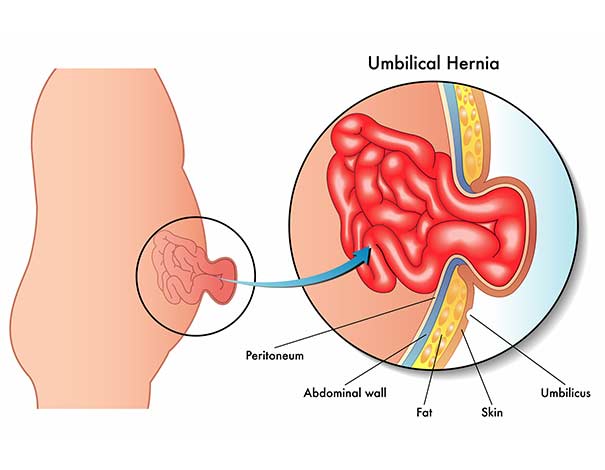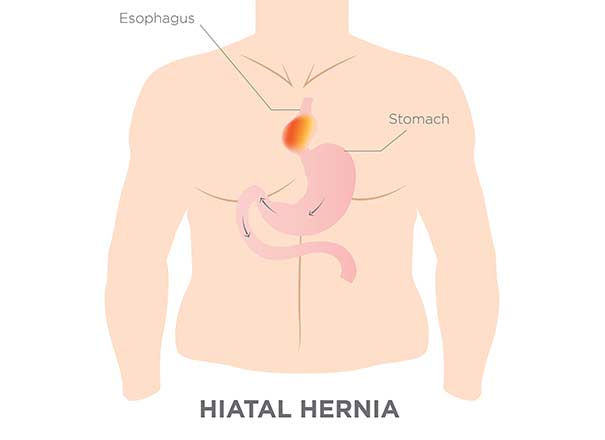Hernia Specialist

When an organ pushes through tissue, it’s referred to as a hernia.
These protrusions are most likely to occur in the abdominal area, although they may also develop in the upper thigh or groin area, or in the stomach or belly button. If you are experiencing discomfort from an inguinal, hiatal, or incisional hernia, you may be referred to a hernia specialist. Umbilical hernias in children and babies less than six months old can also be treated.
How Does a Hernia Specialist Make a Diagnosis?
Incisional and inguinal hernias are typically diagnosed with a physical examination. A hernia specialist may also feel the groin or abdomen while the patient stands or coughs to detect the protrusion. An endoscopy is sometimes performed to diagnose a hiatal hernia. If a barium X-ray is done, the patient ingests a special liquid that allows detailed images of the digestive tract to be produced. With a child who has a suspected umbilical hernia, an ultrasound may be performed to make a diagnosis and determine its exact location.
Lifestyle Changes
A hernia specialist may suggest lifestyle changes for hernias that aren’t producing significant or chronic discomfort. This might include avoiding heavy meals. Symptoms may also be reduced with exercises that specifically target muscles and other soft tissues around the area where the hernia is located. It’s important to note that non-surgical treatment efforts won’t correct hernia itself, although related symptoms may become more manageable. In some cases, lifestyle adjustment may eliminate discomfort altogether.
Does a Specialist Recommend Medication?
Medication may be recommended for patients with a hiatal hernia. Other types of hernias usually require surgery. The type of medication that’s usually suggested or prescribed is used to manage stomach acid. Mild symptoms are sometimes controllable with over-the-counter antacids. Other patients may benefit from H-2 receptor blockers or proton pump inhibitors.


What Type of Surgery May Be Performed?
If symptoms can’t be effectively reduced with lifestyle changes or medication, a hernia doctor usually recommends surgery. Surgery is typically the first treatment option if a hernia is large or causing severe pain. In some instances, an effort may be made to massage the bulge to ease some of the protruding tissue back to its normal location before performing surgery. With hernias affecting the abdominal area, the hole in the abdominal wall is closed are the protruding organ is correctly positioned. The hole is then closed with surgical mesh patch.
Regardless of what type of hernia is involved, surgery can be either a traditional open procedure or a less-invasive laparoscopic operation. A large incision is made to access the affected area and the hernia sac is pushed back in, if possible, or it’s tied off and surgically removed. The edges of the healthy muscle tissue may then be sewn together (herniorrhaphy) if hernias are smaller or if they’ve been present since birth. Open surgery may be performed when:
- A hernia is difficult to reach with less-invasive techniques
- There is more than one hernia to repair in the same area
- The protrusion is extensive or other nearby tissues have been damaged
Laparoscopic surgery is often the preferred method for hernias that are smaller, conveniently located, or easier to repair. It’s done with smaller incisions instead of one large one. A hollow device with a light and lens attached, called a laparoscope, is used to view the affected area where the hernia sac is located. Specially sized instruments are then used to manipulate tissue and correct the damage from the hernia. While there are many benefits associated with laparoscopic surgery, it’s not always the best option. For instance, open surgery is more likely to be recommended if part of the intestines has slipped into the scrotum.
Why Is It Important to See a Specialist?
If any type of hernia goes undiagnosed and treated, the protrusion may become larger and discomfort could gradually increase. Nausea, constipation, and severe pain may be experienced if the bowel becomes obstructed. There’s also the risk of placing excessive pressure on nearby tissues, which could contribute to inflammation and pain. In a worst-case scenario, a strangulated hernia may develop. This occurs if the blood flow to the intestines is significantly reduced. Seeing a specialist could also allow you to resume your normal activities without distracting pain.
Following successful treatment, a hernia specialist can discuss ways to reduce the risk of experiencing the same problem again. For example, you might be advised to lose weight, take steps to prevent chronic constipation, be cautious when lifting anything heavy or awkward, or avoid strenuous abdominal exercises. Stopping smoking may also be helpful, since smoking-related coughing fits could weaken abdominal muscles.

